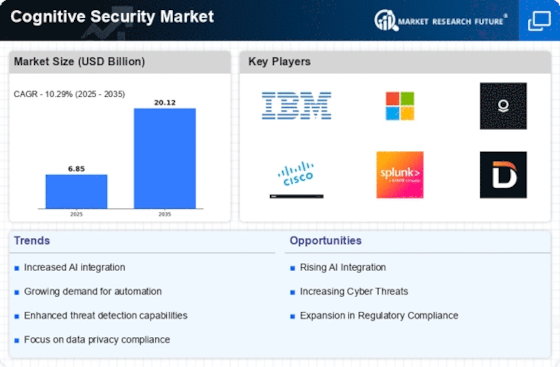Top Industry Leaders in the Cognitive Security Market
Competitive Landscape of the Cognitive Security Market
The cognitive security market, fueled by the ever-evolving threat landscape and exponential data growth, is witnessing a vibrant and dynamic competitive landscape, it's no surprise that established players and nimble startups are jostling for position in this lucrative arena. Delving into this competitive landscape, let's analyze the key players, their strategies, and the factors shaping market share.
Key Players:
- IBM Corporation (U.S.)
- Cisco Systems (U.S.)
- CA Technologies, Inc. (U.S.)
- CSC (U.S.)
- Check Point Software Technologies (Israel)
- Intel Security (U.S.)
- XTN (Italy)
- Symantec Corporation (U.S.)
- Fortinet, Inc. (California, U.S.)
- Cato Networks (Israel)
Strategies Adopted: Differentiation in a Crowded Market
Players in the cognitive security market are employing various strategies to stand out:
- Technology Focus: Some players are focusing on specific AI/ML technologies, such as deep learning or natural language processing, to develop differentiated solutions.
- Vertical Specialization: Catering to the unique needs of specific industries, like healthcare or finance, is another way to gain a competitive edge.
- Partnership Ecosystem: Strategic collaborations with established security vendors or cloud providers can expand reach and expertise.
- Openness and Interoperability: Providing open platforms and APIs that integrate with existing security infrastructure creates a sticky ecosystem for customers.
Factors for Market Share Analysis: Beyond the Big Names
Beyond established players, several factors influence market share:
- Solution Breadth and Depth: Offering a comprehensive suite of cognitive security solutions across various applications (e.g., threat detection, incident response, fraud prevention) attracts customers.
- Data Advantage: Access to vast amounts of security data allows for better training of AI/ML models and more accurate threat detection.
- Deployment Flexibility: Providing both on-premise and cloud-based deployment options caters to diverse customer preferences and infrastructure constraints.
- Pricing and Licensing Models: Competitive pricing and flexible licensing models can unlock new customer segments.
New and Emerging Companies: Disrupting the Established Order
Several new and emerging companies are making waves in the cognitive security market:
- Darktrace: This UK-based company uses AI to detect anomalous behaviors on networks and endpoints, offering real-time threat hunting capabilities.
- Cybereason: They employ a "defense-in-depth" approach with their cognitive security platform, combining AI with human expertise for proactive threat detection and response.
- Deepwatch: Utilizing AI and machine learning for automated incident response, Deepwatch promises faster mitigation of security threats.
Investment Trends: Fueling the Future of Cognitive Security
Current investment trends in the cognitive security market reveal exciting developments:
- Focus on Automation and Orchestration: Investors are backing startups that automate security operations and orchestrate responses across diverse tools and platforms.
- Rise of XDR Solutions: Extended Detection and Response (XDR) platforms that unify data from various sources and leverage AI for threat detection are attracting significant investment.
- Integration with IoT and Operational Technology: With the burgeoning of connected devices, startups developing cognitive security solutions for IoT and OT security are gaining traction.
- Emphasis on User Behavior Analytics: Understanding user behavior patterns to identify insider threats and anomalous activities is another area of active investment.
Navigating the Dynamic Landscape: A Future of Collaboration
The competitive landscape of the cognitive security market is dynamic and fluid. While established players hold a significant share, new and emerging companies with innovative solutions are constantly disrupting the space. As the market matures, collaboration between vendors, cloud providers, and security professionals will be crucial to develop holistic and interoperable solutions. The future of cognitive security lies in the ability to harness the power of AI and ML to stay ahead of ever-evolving threats and create a more secure digital ecosystem.
Latest Company Updates:
January 10, 2024: Palo Alto Networks uncovers a new ransomware strain targeting healthcare institutions, dubbed "Medusa," capable of encrypting medical records and disrupting critical systems.
January 12, 2024: IBM Security X-Force reports a significant rise in phishing attacks targeting remote workforces, exploiting anxieties surrounding the pandemic and cost-of-living increases.










